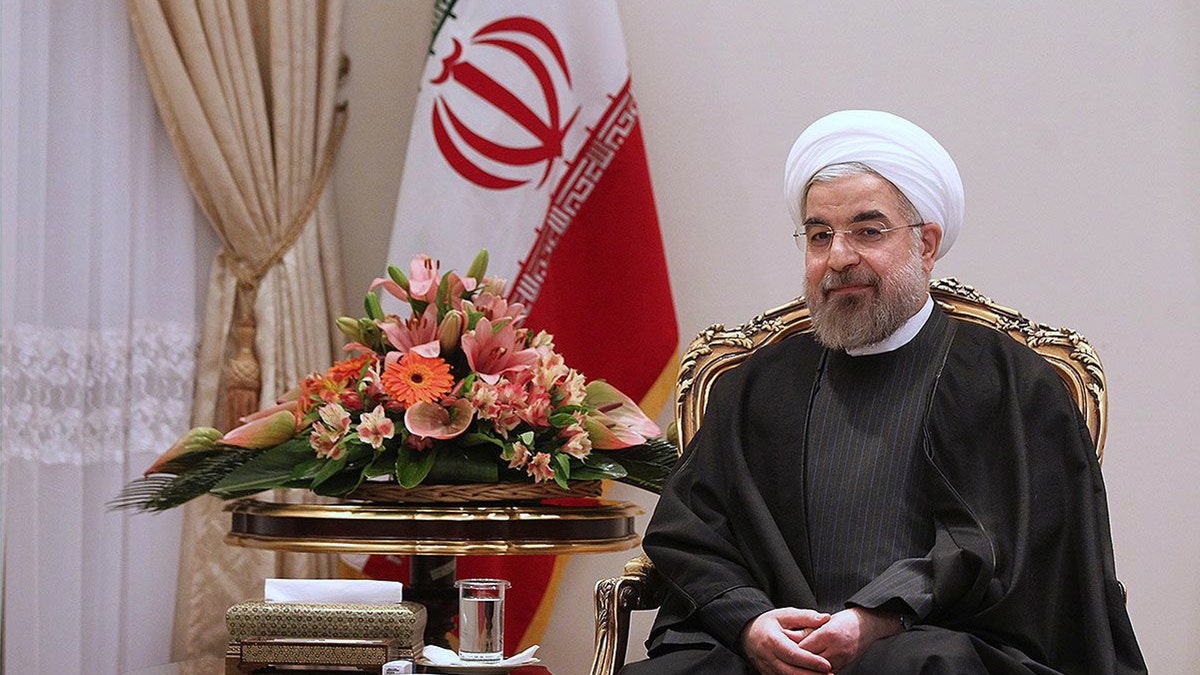
In this photo released by the official website of the office of the Iranian Presidency, President Hassan Rouhani sits in a meeting with Swedish Foreign Minister Carl Bildt at the Presidency compound in Tehran, Iran, Tuesday, Feb. 4, 2014. Iran's official IRNA news agency quoted President Hassan Rouhani as saying his country is ready for final nuclear talks with world powers. The Tuesday remarks came during a meeting with visiting Swedish Minister for Foreign Affairs Carl Bildt. (AP Photo/Presidency Office, Mohammad Berno) (The Associated Press)
WASHINGTON – The Obama administration is temporarily waiving sanctions on Iran's state broadcaster, a senior Obama administration official said. The move could be seen as a confidence-building measure as the U.S., Iran and five other world powers prepare to open talks this month on a final agreement on Iran's disputed nuclear program.
The official said the move comes after the U.S. determined that "harmful satellite interference" was not currently emanating from Iran. The U.S. levied sanctions on Islamic Republic of Iran Broadcasting last year, charging that the state-run broadcaster was blocking foreign channels that the government found objectionable and citing human rights groups who say the broadcaster distorted and falsified reports.
The official confirmed the waiver Thursday, the same day the Treasury Department announced it was penalizing dozens of foreign companies and individuals for evading Iran sanctions. The targets of the sanctions are located in Turkey, Spain, Germany, Georgia, Afghanistan, Iran, the United Arab Emirates and Liechtenstein. Treasury accused the entities and individuals of evading U.S. sanctions against Iran, aiding Iranian nuclear and missile proliferation, and supporting terrorism.
The 180-day broadcasting waiver will allow non-U.S. companies to provide the Iranian broadcaster with satellite services without being exposed to American penalties, according to the official, who was not authorized to discuss the move publicly by name and thus spoke on condition of anonymity. The official said the actions were reversible if satellite interference from Iran begins again. The U.S. will reevaluate the situation in two months.
The waiver is separate from the $7 billion in international sanctions relief Iran secured as part of the six-month nuclear agreement it signed last year with the U.S., Britain, France, Germany, China and Russia. The parties are due to begin a new round of talks later this month, aimed at working out a final agreement to ease international concerns over Iran's nuclear program.
It was unclear what the economic impact of the IRIB sanctions waiver would be.
The move could rankle sanctions supporters on Capitol Hill, where momentum for new penalties has appeared to stall. The pro-Israel group AIPAC said Thursday that it agreed with lawmakers who said there should not be a vote on a tougher sanctions bill while diplomatic negotiations are underway.
U.S. officials insist the sanctions relief the international community has provided so far to Iran does not mean the Islamic republic is open for business. However, European investors are eagerly eying opportunities in Tehran. More than 100 potential investors from France arrived in Iran on Monday, following visits by officials from the Netherlands, Germany, Italy, South Korea and other countries ready to explore new trade opportunities. Automobile makers also are eyeing Iran's workforce.
Under the terms of the six-month nuclear deal, Iran agreed to slow its uranium enrichment program to a level that is far below what would be necessary to make a nuclear bomb. It also agreed to giving international inspectors more access to its facilities as a way to give world leaders confidence that it is not trying to build weapons in secret.
___
Follow Julie Pace on Twitter at http://twitter.com/jpaceDC





















